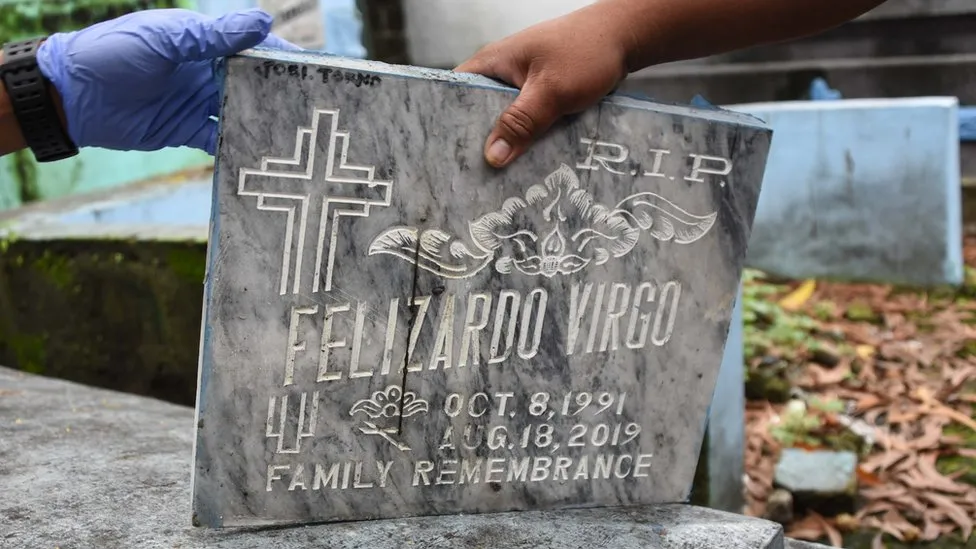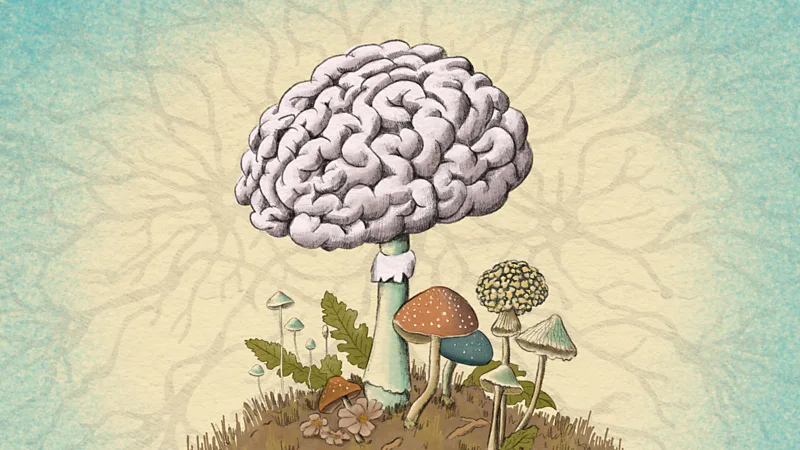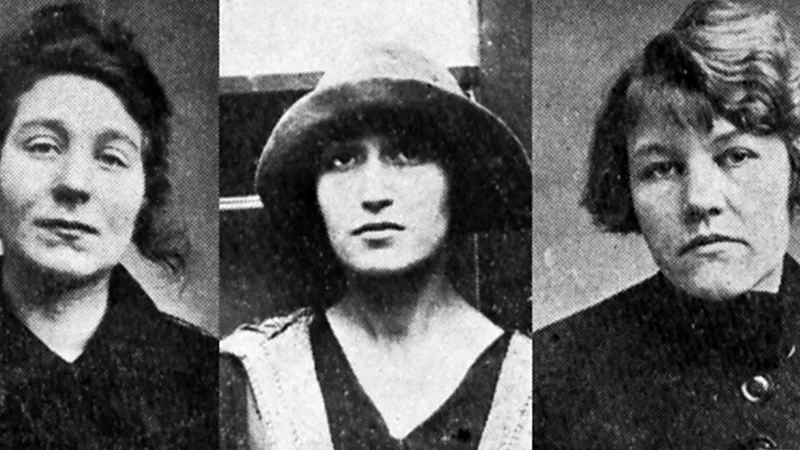Philippines: Bone diggers seek justice for dead in Duterte's drug war
At Manila North Cemetery, Father Flavie Villanueva - Bible in one hand, and a plastic bottle of holy water in his pocket - prays with a bereaved mother beside her son's grave.

They watch as the front of the vault to the grave is hammered off. Inside are the remains of Felizardo Virgo, shot dead on 18 August, 2019, aged 27.
His corpse is carefully removed and placed inside a black body bag. Before it's zipped shut, Father Flavie checks the tomb to ensure every bit of the skeletonised remains has been removed - even a tiny piece of bone might reveal something more about the shooting.
Erlinda hopes her son's bones will speak; that they will deliver justice for families like hers - thousands of them - who have lost their loved ones to a ruthless "war on drugs" in the Philippines.
At the forefront of this effort are Father Flavie and a forensic pathologist, Dr Raquel Fortun, who have joined forces to collect evidence that may one day be used in a judicial inquiry into these deaths.
There have been few investigations, and the Philippine government has refused access to investigators from the International Criminal Court (ICC), whose prosecutor first expressed concern about drug-related killings in 2016.
But that has not deterred Father Flavie or Dr Fortun, who hope that what they have found can make it to the ICC. Since July 2021, Dr Fortun has autopsied the remains of more than 90 victims, and discovered multiple inconsistencies. These include gunshot victims whose death certificates said they died of "natural causes", and "copy-pasted" reports that have little to do with the cause of death.
The Philippine government estimates that more than 6,252 people have been gunned down by the police and "unknown assailants" since former President Rodrigo Duterte declared a "war on drugs" in 2016, when he won the election. Rights groups say the numbers could actually run into the tens of thousands.
Police say the victims were drug lords or peddlers, who they often killed in "self defence" during shoot-outs. But many families claim their sons, brothers or husbands were simply in the wrong place at the wrong time.
The campaign was controversial and drew huge international criticism, but it had its supporters in a country where millions use drugs, mostly methamphetamine, known locally as "shabu".
Mr Duterte's successor Ferdinand Marcos Jr promised a different, less violent approach when he took office in 2022.
"We've been catching the large-scale pushers instead of going after every user, because the way the president sees it - this is a health problem, an addiction problem," says assistant secretary at the Justice Department, Jose Dominic Clavano.
But the Dahas Project at the University of the Philippines recorded 342 drug-related killings in Mr Marcos' first year - 40 more than in the last year of Mr Duterte's rule. And they say around 40% of those killed were small-time users and dealers.
"That's not something this government condones," Mr Calvano says.
What he does recognise, though, is that abuses have been committed by the police.
Back at the cemetery, two more bodies are exhumed under Father Flavie's watchful eye. Like Felizardo, both men were shot dead in 2019. Overcome, one of their family members sinks to the ground, her legs buckling beneath her.
"It's very traumatic," says Father Flavie, his voice low. "This isn't a normal kind of death, so it's painful. It's heavy, and it makes you angry."
Mr Duterte's government had said they were going after peddlers, drug lords and those who protected them. But critics say the victims, mostly male, were from the poorest communities.
Many are buried in rented graves. If their families can't afford to renew the lease, the remains are removed and disposed of in a common grave. Father Flavie has determined this will not happen to the loved ones of his parishioners.
So as part of his on-going support to victims of the drug war, he arranges exhumation, cremation and then the return of ashes to families during a church blessing.
The funeral van carrying the three bodies weaves its way out of the huge cemetery, dodging small children and chickens. But first, those remains have another appointment.
Dr Fortun is waiting in the morgue at the Philippine General Hospital, to take delivery of the newly-exhumed bodies.
In a population of some 100 million people, the Philippines has only two forensic pathologists - she is one of them.
She met Father Flavie when the drug war killings started.
"I heard about the plan that they would exhume. I stepped in - show me the body. So, he started bringing the bodies over," she says.
"My primary concern would be: are there bullets? The bullets are evidence that can link a victim to a gun, and the shooter."
She has kept all the bullets she has recovered so far. If these cases don't come before a Filipino court of law, Dr Fortun hopes the ICC will ask for her meticulously-kept autopsy reports - and the bullets.
"I'm really hoping that at some point we can get justice," she says.
Further inside the hospital's morgue, Dr Fortun begins her examination of another young man's remains recently delivered by Father Flavie.
She unzips the bag, revealing a jumble of bones - some still with soft tissue attached - and begins taking photos.
"I'm already seeing fractures in the head," she says, removing some long, black hair. "This one looks like a bullet hole - on the right side of this young man's head."
She pulls out disintegrating clothing from the body bag - a white shirt and black trousers.
The woman who kills drug dealers for a living
"There's an attempt by the family to send them off in a special way… So, they wear a formal shirt - something they probably didn't wear when they were alive.
"You see, the teeth are very badly maintained. That means they killed the poorest of the poor. You don't forget these were people, and they were loved."
Dr Fortun aims to return personal effects to the families. Some of those are unexpected.
"Irony of ironies, I've had two cases where there were remnants of a plastic band [bracelet] from the Duterte campaign. One of the men's wives said her husband thought wearing it would make him safe, because he was a Duterte supporter."
Next, Dr Fortun lifts out the bones - legs, arms, ribs, skull - and places them in large, silver trays. Mortuary workers will wash them and lay them out on a wooden table in the correct anatomical position for further study.
In the Philippines, autopsy isn't automatic in cases of violent death, although Dr Fortun has lobbied for a change in the law.
"Forensic science searches for the truth, and maybe that's the problem - a lot of Filipinos don't want the truth to come out."
It's the police who are in charge.
"They do the crime scene investigation, they do the medico-legal examination of the body, the crime lab is theirs. So, what kind of results come out? The police do the killing and they do the investigating. That's how you get away with murder."
'The Rock' behind Duterte's drugs war
Defenders of Mr Duterte's campaign, including General Ronald dela Rosa, who was chief of the National Police until 2018, said drug suspects would not have died had they not resisted arrest. He also claimed the anti-narcotics campaign had succeeded in reducing the number of drug dependents in the country.
Dr Fortun's work is painstaking - and in addition to her duties as professor in the College of Medicine and chair of the Department of Pathology at the University of the Philippines. It will be weeks before she completes her reports of the three newly-exhumed victims - including Felizardo.
He was shot dead on an August evening in 2019 after leaving home on an errand. Erlinda went out to see her son lying bloody on the ground. One of the witnesses told her the shooter was familiar - he looked like a policeman.
"I asked that witness - are you willing to testify? But, of course, the witness said no, they weren't. If people see something wrong, they want to turn a blind eye, and stay away from potential trouble."
Felizardo lived in Parola Tondo, sometimes described as Manila's worst slum. Close to the port, it's a maze of concrete pathways and makeshift homes. Felizardo was also a drug user. But his mother says he had begun to mature, and recently got a job with a trucking company.
"He'd turned his life around," Erlinda says, through tears. "This was Felizardo's time to prove himself to those who didn't believe in him."
Mr Duterte, she says, "has no right to live."
"The police were left alone in the field - that's how all these abuses have happened," Mr Clavano says.
Philippine drug war: Profiting from death?
He adds that ongoing reform means prosecutors will work more closely with the police in future, visiting crime scenes. "This is our way of doing a check and balance with the police."
But he sees no reason for the ICC to visit: "The ICC would only be able to come in if there's no working judicial system in the Philippines. But there is a working judicial system."
The ICC, however, has said it isn't satisfied the Philippines is making a genuine effort to carry out investigations and criminal prosecutions, and that its own investigation will continue.
There have been a tiny handful of cases, where police officers have been arrested.
Six were taken into custody and face murder charges in the death of Jerhode "Jemboy" Baltazar, a 17-year-old fisherman who was gunned down in broad daylight in the neighbourhood of Navotas in Metro Manila last August.
Mistaking him for a murder suspect they were chasing, the police shot Jemboy as he was cleaning his fishing boat. He fell into the water. But police made no attempt to pull him out. It was Jemboy's uncle who retrieved his corpse hours later.
When Father Flavie heard the story, he arranged the removal of Jemboy's body from the funeral home to Dr Fortun's morgue.
She concluded the gunshot to Jemboy's head hadn't caused death outright. And that if the police had pulled him out of the water, "potentially he could have survived".
"So, he drowned because he fell in the water, because he was shot in the head. We classify this as homicide," she says.
Then Dr Fortun got some unwelcome visitors. Firstly, from the Navotas police - the precinct responsible for the shooting. And secondly, from the state prosecutor. Both wanted the autopsy report.
"This is enough - I'm being harassed," thought Dr Fortun. In the Philippines, the assassination of public figures isn't unheard of. She took to X, formerly Twitter, telling her 170,000 followers about the visits, adding she was putting the information out there for whatever protection it may afford her.
Father Flavie is still managing the fallout from the shooting. Jemboy's relatives were allegedly being watched. Now the family is living in a secret location paid for by funds raised by the priest.
With no sign of Mr Duterte being held accountable, "everyone is hoping the ICC will step in," Dr Fortun says. She is ready.
Father Flavie, too, is optimistic the victims of Mr Duterte's drug war will see justice.
"One family at a time, one soul at a time."
-bbc







